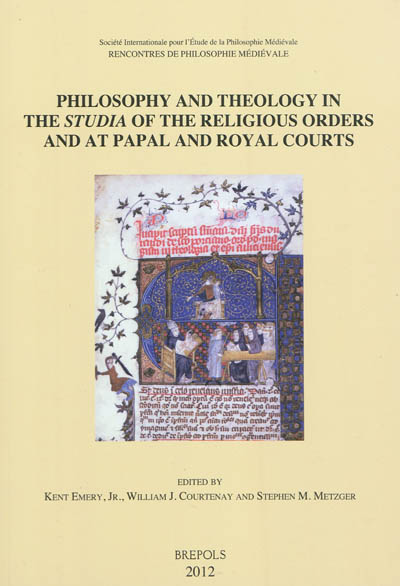en savoir plus

Carte fidélité
Permet à tous ses détenteurs d'obtenir 5% de réduction sur tous les livres lors du retrait en magasin (réduction non cumulable avec les réductions de type étudiant).
Offre également un certain nombre d'avantages auprès de nos partenaires.
Wishlist
Avec les favoris, retrouvez dans un espace les sélections effectuées au fur et à mesure de vos navigations dans le site.
Constituez pour votre usage personnel vos listes de livres en prévisions d'achats futurs et votre sélection d'articles, dossiers, événements, vidéos ou podcasts préférés ou à découvrir plus tard...
Il suffit simplement de cliquer sur "Ajout Favori" sur chaque page qui vous intéresse pour les retrouver ensuite dans votre espace personnel.
Requiert un compte Mollat
Mes Alertes
Requiert un compte Mollat
Philosophy and theology in the studia of the religious orders and at papal and royal courts : acts of the XVth Annual Colloquium of the Société internationale pour l'étude de la philosophie médiévale, University of Notre Dame, 8-10 october 2008
Auteur : Société internationale pour l'étude de la philosophie médiévale. International colloquium (15 ; 2008 ; South Bend, Ind.)
en savoir plus
Résumé
Contributions à la connaissance de l'institutionnalisation du savoir philosophique et théologique au Moyen Age. Elles portent sur l'enseignement et l'étude de la philosophie et de la théologie scholastique dans les écoles (studia) des dominicains, franciscains, augustiniens, carmélites et autres ordres monastiques, ainsi que sur l'activité intellectuelle à la cour papale et dans les cours royales. ©Electre 2025
Lire la Quatrième de couverture
Réduire la Quatrième de couverture
Most scholars know that the great universities were the institutional setting of Scholastic philosophical and theological activity in the later Middle Ages. Fewer realize, however, that perhaps far more Scholastic learning in the liberal arts and theology took place in the studia or study-houses of the religious orders, which out-numbered the universities and were more widely distributed across Europe. Indeed, most members of the mendicant orders received most or all of their learning in the liberal arts and theology in the studia of their order, and the most famous members of the orders (e.g., Albert the Great, Thomas Aquinas and John Duns Scotus) spent more time teaching in the studia than they did serving as Regent Masters in the university proper. As a consequence, the greater part of later medieval Scholastic literature was produced in the institutional context of the studia of the religious orders. Moreover, there were other significant institutional loci for Scholastic learning and discourse in the later Middle Ages besides the universities and the study-houses, namely the Papal Court-notably the Sacred Palace at Avignon-and several royal courts, for example, the courts of Robert the Wise in Naples and of the Emperor Lewis IV in Munich. It is not surprising, therefore, that many of the greatest Scholastic masters at different times taught in, or were associated with, all of these venues. This volume, which originated at the XVth annual Colloquium of the Société Internationale pour l'Étude de la Philosophie Médiévale held at the University of Notre Dame (USA) in October 2008, contains essays concerning the study and teaching of philosophy and theology in the studia of the Dominicans, Franciscans, Augustinian Hermits, Carmelites, Benedictines and Cistercians, as well as the intellectual activity at the Papal Court in Rome and Avignon and at various royal courts (London, Naples, Munich).
Fiche Technique
Paru le : 09/02/2012
Thématique : Théologie chrétienne
Auteur(s) : Auteur : Société internationale pour l'étude de la philosophie médiévale. International colloquium (15 ; 2008 ; South Bend, Ind.)
Éditeur(s) :
Brepols
Collection(s) : Rencontres de philosophie médiévale
Contributeur(s) : Editeur scientifique (ou intellectuel) : Kent Emery - Editeur scientifique (ou intellectuel) : William J. Courtenay - Editeur scientifique (ou intellectuel) : Stephen Michael Metzger
Série(s) : Non précisé.
ISBN : 978-2-503-54326-0
EAN13 : 9782503543260
Reliure : Broché
Pages : XIX-764
Hauteur: 24.0 cm / Largeur 17.0 cm
Épaisseur: 4.5 cm
Poids: 0 g
